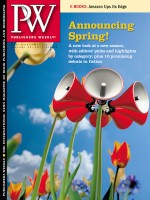Dial publisher Susan Kamil says, "I was blown away by Paul McEuen's ability in Spiral to take the most cutting edge nanoscience, interweave it with bio-weapon development in World War II, and create a spellbinding thriller." Jane Gelfman of Gelfman Schneider represented Spiral. (Film rights have also been sold.)
McEuen is a 47-year-old physics professor at Cornell. In that capacity, he has, he explains, "made a transistor from a single molecule, along with the world's smallest guitar and the world's thinnest drum, with a drumhead only one atom thick."
Seven years ago, he began crafting Spiral while on sabbatical, setting himself a goal of writing 1,000 words every morning. Novel writing, he says, is "not unlike exploratory science, a blind stumble in the dark for months on end in search of a goal sensed more than seen." The novel went through about 15 drafts before reaching its final incarnation.
Japan's Unit 731, a biological weapons program operated during WWII, not only plays a part in the book, but it has personal significance for the author: McEuen's grandfather earned two Purple Hearts fighting in the Pacific in that war. "The suffering he saw never left him," says McEuen.
There's another autobiographical thread invisible to almost anyone but those who know McEuen personally—all the major characters in Spiral are named after his and his wife's dogs. McEuen's wife, a psychologist by trade, runs an all-volunteer dog rescue organization, and McEuen notes wryly, "Our newest pair are named Snickers and Elfie, presenting me with a real challenge for my next novel."



 Volume 258
Issue 04
01/24/2011
Volume 258
Issue 04
01/24/2011





